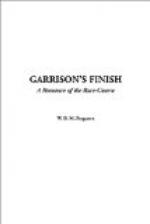And so Sue, the blood in her cheeks, handed all her available cash to Drake to place on the name of Garrison. She would pretend it was the original. Just pretend.
“Here they come,” yelled Drake, echoed by the rippling shout of the crowd.
The girl rose, white-faced; striving to pick out the blue and gold of the Desha stable.
And here they came, the thirteen starters; thirteen finished examples of God and man’s handicraft. Speed, endurance, skill, nerve, grit—all were there. Horse and rider trained to the second. Bone, muscle, sinew, class. And foremost of the string came Swallow, the favorite, Red McGloin, confidently smiling, sitting with the conscious ease of the idol who has carried off the past year’s Brooklyn Handicap.
Good horses there were; good and true. There were Black Knight and Scapegrace, Rightful and Happy Lad, Bean Eater and Emetic—the latter the great sprinter who was bracketed with Swallow on the book-maker’s sheets. Mares, fillies, geldings—every offering of horse-flesh above three years. All striving for the glory and honor of winning this great sprint handicap. The monetary value was the lesser virtue. Eight thousand dollars for the first horse; fifteen hundred for the second; five hundred for the third. All striving to be at least placed within the money—placed for the honor and glory and standing.
Last of all came The Rogue, black, lean, dangerous. Trained for the fight of his life from muzzle to clean-cut hoofs. Those hoofs had been cared for more carefully than the hands of any queen; packed every day in the soft, velvety red clay brought all the way from the Potomac River.
Garrison, in the blue and gold of the Desha stable, his mouth drawn across his face like a taut wire, sat hunched high on The Rogue’s neck. He looked as lean and dangerous as his mount. His seat was recognized instantly, before even his face could be discerned.
A murmur, increasing rapidly to a roar, swung out from every foot of space. Some one cried “Garrison!” And “Garrison! Garrison! Garrison!” was caught up and flung back like the spume of sea from the surf-lashed coast.
He knew the value of that hail, and how only one year ago his name had been spewed from out those selfsame laudatory mouths with venom and contempt. He knew his public. Adversity had been a mighty master. The public—they who live in the present, not the past. They who swear by triumph, achievement; not effort. They who have no memory for the deeds that have been done unless they vouch for future conquests. The public—fickle as woman, weak as infancy, gullible as credulity, mighty as fate. Yes, Garrison knew it, and deep down in his heart, though he showed it not, he gloried in the welcome accorded him. He had not been forgotten.
But he had no false hopes, illusions. His had been the welcome vouchsafed the veteran who is hopelessly facing his last fight. They, perhaps, admired his grit, his optimism; admired while they pitied. But how many, how many, really thought he was there to win? How many thought he could win?




